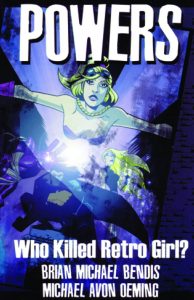 Here’s the thing. Either I (via listening to my friends and Amazon recommendations, it’s true, but in this case also on my own merits, since I bought it used and un-recommended) am really good at picking graphic novel series that I will like, or else I am a sucker for the format and just like any of them that I read. I don’t wish to test the theory by picking up something I expect to dislike and seeing how it goes; apparently because my happiness trumps science.[1] I’m not exactly sure how to tell you to calibrate your expectations when I don’t know which of the options is the truth, but at least now you know the pain I go through on a daily basis in trying to bring you as objective of a report as possible.
Here’s the thing. Either I (via listening to my friends and Amazon recommendations, it’s true, but in this case also on my own merits, since I bought it used and un-recommended) am really good at picking graphic novel series that I will like, or else I am a sucker for the format and just like any of them that I read. I don’t wish to test the theory by picking up something I expect to dislike and seeing how it goes; apparently because my happiness trumps science.[1] I’m not exactly sure how to tell you to calibrate your expectations when I don’t know which of the options is the truth, but at least now you know the pain I go through on a daily basis in trying to bring you as objective of a report as possible.
Thanks to having completed and / or caught up on so many of my ongoing series, I have as implied started a new one: Powers, by Brian Michael Bendis. (Oh, so right, technically that made it kind of a known quantity? I still say my selection algorithm is probably superior!) The simple but fairly cool concept is one I’ve seen a lot of during my years of Marvel comics, only from the other side. In a world full of superheroes and supervillains, the cops still have to solve crimes, keep people safe, generally do their jobs. Who Killed Retro Girl? is a story about that, with the added twist that the big crime that defines the new partnership between police detectives Christian Walker and Deena Pilgrim is the murder of one of these superheroes. Aside from the mystery, it’s pretty much an introductory book in every way: to the world, to the characters, to their relationships, to their antagonists. So mostly, what your interest level will be come downs to whether you like them and their world or not.
I did.
[1] Science!
I have a really, really hard time disliking graphic novels. But I thought this one was pretty mediocre.
In the line of things that are similar, Bendis’ Alias series (about a private detective in the regular Marvel Universe) is better and Alan Moore’s Top 10 (superhero cops) is like the same premise only way more interesting.
Having not read these *or* Astro City, I forgive myself for letting it float on the premise alone. You’re not wrong though, I’ll need more than the premise to enjoy much more.
(I mean, I liked the characters too, but that’s nearly always necessary and insufficient.)
Man…I would say the whole Ultimates line is informed by the sensibility of Astro City. You should definitely read that yesterday, dude.
I don’t know that the Ultimates owe anything to Astro City — I’d actually say that Astro City is an attempt to distill the awesome bits of Classic Marvel. It’s like: You read Marvels, also by Busiek, right? Astro City is him being all, “Man, that only made sense to people who already get comics, I need to make this work for people who didn’t spend decades soaking in the Marvel universe,” and then making up a universe from scratch that has all of the virtues and very few of the flaws of the classic Marvel Universe, and telling Marvels-shaped stories in there.
So, so good. I think it is the single best thing written with superheroes (better than Watchmen, because Watchmen is unquestionably great but is no fun at all), and the only way to really get people into superheroes if they aren’t willing to do what you’re doing with, you know, reading through decades of continuity.
Pingback: Powers: Gods | Shards of Delirium